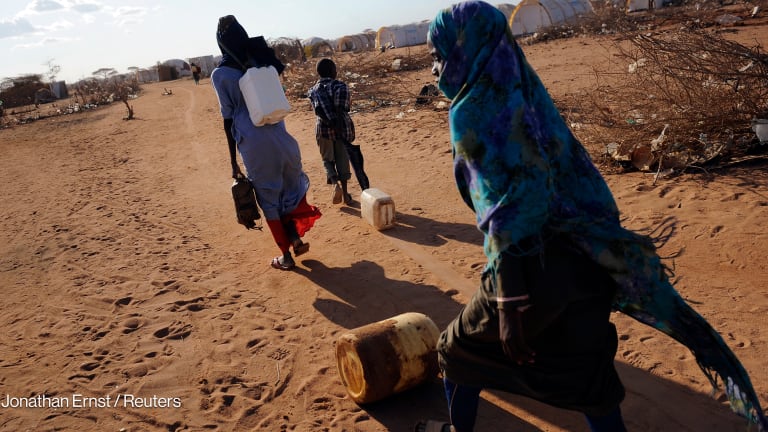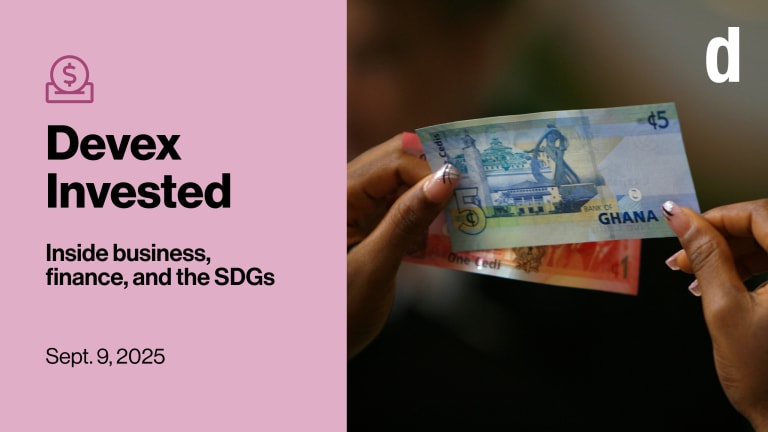Finding the money to keep social safety nets afloat in Africa
In Africa, the key to the economic recovery post-COVID-19 will be maintaining and expanding economic and social safety net systems, Rabah Arezki, chief economist at AfDB, told Devex.
NAIROBI — While African nations have largely been spared the more extreme health effects of the COVID-19 pandemic — such as overwhelmed health systems — the continent stands to be the most affected by the economic impacts of the pandemic because of its overreliance on external flows, Rabah Arezki, chief economist and vice-president of economic governance and knowledge management at the African Development Bank, told Devex. Key to the recovery from the pandemic will be maintaining and expanding the economic and social safety net systems, at least until a vaccine is rolled out across the continent, Arezki said. “We need to extend these for a few more months until we cross that bridge to the vaccine,” he said. Governments have provided support to citizens and businesses through rebates on utility payments, postponement of tax payments, food aid, health insurance access, and cash transfers, among other protection programs. “What countries need is fresh resources, and this should be largely concessional, partly from multilateral sources, but … there needs to be a concerted effort to reduce the cost of private debt.” --— Bartholomew Armah, acting director of the macroeconomics and governance division, U.N. Economic Commission for Africa But maintaining these efforts, which help to protect people from spiraling into poverty and injecting liquidity into economies, is a big challenge due to limited financing, Arezki said. Key strategies to find the financing needed and maintain it include changing the sovereign debt architecture, eradicating leakages, reducing capital flight, and turning savings into investments, according to economists. And much of this comes down to improved governance. “Where I think everybody should be working towards is improving the governance of the system, on many fronts, so that these actions have a dent of this big hole that we are facing,” Arezki said. Beyond debt relief Prior to the pandemic, African countries were experiencing fairly rapid growth, but also accumulating debt which had transitioned largely from concessional debt to more expensive commercial debt. Six of the seven countries globally in debt distress are in Africa. “As a result, African countries have been confronted with this pandemic with a very tight fiscal envelope,” said Bartholomew Armah, acting director of the macroeconomics and governance division at the U.N. Economic Commission for Africa, during the African Economic Conference 2020 last week. At the same time, exports from African nations have declined in both volume and value, and health-related expenditures have risen, he said. While the G20 Debt Service Suspension Initiative, which provides countries with temporary suspension of debt-service payments until June 2021, created some breathing room, the recovery will be more complicated than just providing debt relief or suspension, Armah said. “That is simply kicking the can down the street,” Armah said. “What countries need is fresh resources, and this should be largely concessional, partly from multilateral sources, but … there needs to be a concerted effort to reduce the cost of private debt.” One opportunity to explore is the special drawing rights of countries, Armah said, which is an issuance from the International Monetary Fund that provides central banks with liquidity. But IMF can only make these issuances if its shareholders agree. Currently the U.S. — its largest shareholder — is in opposition. The last approved issuance was made in 2009. Armah added that the recapitalization of multilateral development banks is also important to ensure the banks have the fiscal muscle to support countries with concessional financing. These banks should also have a less conservative approach in their lending practices, he said. Western countries have been “awash with resources” as a result of fiscal stimulus efforts in response to the pandemic and interest rates are negative or near zero in these countries, Armah said. “How can we channel some of these resources back in the form of investable financing to African countries to support their development? Particularly, in the area of private sector resources coming back to Africa for countries with access to capital markets,” he said. Reducing leakages and capital flight Given limited resources, governments must spend more wisely, said Hanan Morsy, director of macroeconomic policy, forecasting, and research at AfDB, during the conference. This involves a shift toward more growth-enhancing investments, such as in the sectors of infrastructure, education, and health. This also includes a shift away from other forms of spending, such as inefficient energy subsidies. Reducing other leakages is also crucial. Corruption and monopolization of sectors need to receive increased scrutiny, economists at the conference said. “They have no place at this time of crisis,” Arezki said. For example, in South Africa, an ongoing investigation is examining impropriety around 658 contracts resulting from the government’s COVID-19 relief package. Because of this, there is a need for open government reforms that push for transparency around COVID-19 stimulus contracts and incoming aid, as well as structures that allow for oversight of spending and awarding of contracts by citizens and civil society, said Sanjay Pradhan, CEO at the Open Government Partnership. Arzeki added that while capital flight — when assets or money rapidly flow out of a country — is an issue that has long been pervasive in Africa, it’s become a more critical issue to focus on now during the pandemic, and history has shown that when countries are burdened with debt distress, capital flight often increases. “During these trying times, intelligent capital controls can help. I would advise authorities to think about these types of capital controls to incentivize money that flows in for the longer haul, and to avoid more speculative money and money that's escaping the continent,” he said. Wealth tax and turning savings into investments While tax revenue mobilization is a way to generate resources, it also must be done cautiously. It’s a balancing act to not derail economies during the current economic landscape, Arezki said. A wealth tax — such as a housing tax of properties above a certain value — could be an appropriate strategy for governments. “These are exceptional times and a wealth tax makes sense,” Arezki said. But beyond taxes, there is a need for concerted efforts to mobilize savings into investments, Arezki said. Foreign and domestic savings tend to sit in the banking system, whereas banks on the African continent should play a more active role around risk identification and information gathering around potential investments. Banks have been “sleeping at the wheel” rather than laying the groundwork to take on riskier investments, he said. “There are important fixes to the financial system that could channel this funding not necessarily to government coffers, but to the economy as a whole,’ Arezki said.
NAIROBI — While African nations have largely been spared the more extreme health effects of the COVID-19 pandemic — such as overwhelmed health systems — the continent stands to be the most affected by the economic impacts of the pandemic because of its overreliance on external flows, Rabah Arezki, chief economist and vice-president of economic governance and knowledge management at the African Development Bank, told Devex.
Key to the recovery from the pandemic will be maintaining and expanding the economic and social safety net systems, at least until a vaccine is rolled out across the continent, Arezki said.
“We need to extend these for a few more months until we cross that bridge to the vaccine,” he said.
This story is forDevex Promembers
Unlock this story now with a 15-day free trial of Devex Pro.
With a Devex Pro subscription you'll get access to deeper analysis and exclusive insights from our reporters and analysts.
Start my free trialRequest a group subscription Printing articles to share with others is a breach of our terms and conditions and copyright policy. Please use the sharing options on the left side of the article. Devex Pro members may share up to 10 articles per month using the Pro share tool ( ).
Sara Jerving is a Senior Reporter at Devex, where she covers global health. Her work has appeared in The New York Times, the Los Angeles Times, The Wall Street Journal, VICE News, and Bloomberg News among others. Sara holds a master's degree from Columbia University Graduate School of Journalism where she was a Lorana Sullivan fellow. She was a finalist for One World Media's Digital Media Award in 2021; a finalist for the Livingston Award for Young Journalists in 2018; and she was part of a VICE News Tonight on HBO team that received an Emmy nomination in 2018. She received the Philip Greer Memorial Award from Columbia University Graduate School of Journalism in 2014.








